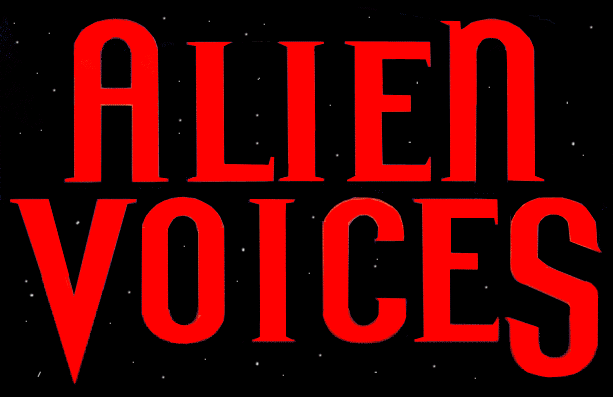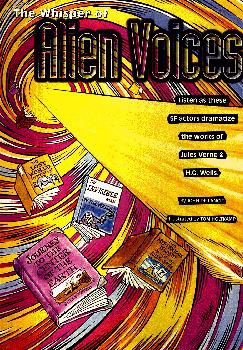
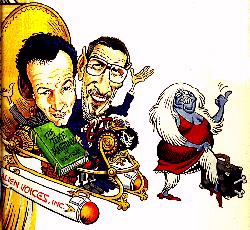
The Whisper of ALIEN VOICES PART II
Listen as these SF actors dramatize the works of Jules Verne & H.G. Wells.
By: JOHN de LANCIE
Illustrated by: Tom Holtkamp
(Reprinted from STARLOG Magazine July 1997 #240)
(Stroy continued from "The Whisper of Alien Voices" Part I)
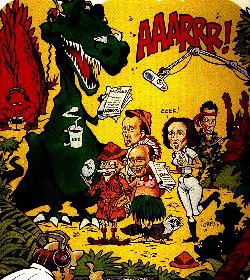 "The Lost World"© Alien Voices®, Inc. All Rights ReservedAt a time when the Industrial Revolution was sending so many of its workers underground to mine the coal that fed the industries, or to dig a subway system in London, Wells wondered what it might come to in the future-far in the future-if this social dichotomy ran its course. Thus the Time Traveller discovers to his horror that the world of the distant future has become two: the above-world and the under-world. The twist in the story is the way in which the roles have become grotesquely reversed. Journey to the Center of the Earth, which was written 30 years earlier (1864), also remains a marvelous tale, albeit not as dark. Verne brings an enthusiasm to science fiction that Wells was already beginning to question just a few years later. Those first readers of Verne were so fascinated by the scientific travelogue quality of his writing that the stories themselves don't hold up in quite the dramatic form that we have come to prefer. Journey has so many digressions that it's sometimes hard to keep track of the story. I think Nat did a marvelous job bringing them to life without compromising their integrity. Leonard, Nat and I have talked quite a bit about what we want to accomplish with Alien Voices, and much of our discussion is motivated by our feeling that modern SF has gotten away from the philosophy that attracted people to the genre in the first place. Most classic SF holds great hope for technology and humanity. Both Wells and Verne were visionaries. Verne, in particular, conceived a wide range of inventions he felt would help resolve the world's problems. I've always found it unfortunate that SF literature is generally pooh-poohed. In his day, Verne's writings were considered "boy fiction," a dismissive term that persists today. But, as we all know, boys (and girls) grow up and carry with them many of the ideas and hopes that they first discovered in their adolescence. This happens to be true in my own life. One of my earliest remembrances of just such a "boy fiction" book that made a great impression on me was Verne's Mysterious Island. I read it not as literature, but as a primer for survival. To me, there was nothing more noble than the idea of being cast away on an island and creating a society out of skill, diligence and hard work. It's an ideal that I have kept with me throughout my life, not unlike the images of Robinson Crusoe or Swiss Family Robinson. We hope, in the near future, to produce Mysterious Island and bring that enthusiasm to the piece. And then, perhaps we'll go back to Wells, to visualize (through sound) The Invisible Man.
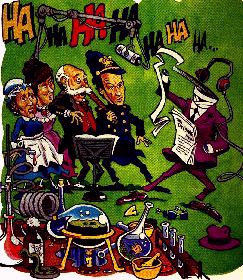 "The Invisible Man"© Alien Voices®, Inc. All Rights ReservedAh yes, producing. This is how we do it. The original story is always the key factor. Do we like it? Does it have enough characters, does it have too many? Is it commercial-recognizable? And, most of all, do we want to "live" with it for the time it takes to produce? Nat then begins the arduous and time-consuming task of adapting the book into dramatic form, translating the work from silent prose into spoken dialogue. I don't get involved until he's finished with the first draft. We developed this relationship while working on our first play together and have found it successful. Nat is very fast, very prolific and has great stylistic appreciation of the material. I then add my director/actor's eyes and ears to make sure that the scenes have a playability. We might have two or three revisions toward that end. Leonard will then review the material and give his notes, all with the same eye toward making it dramatic and fun.
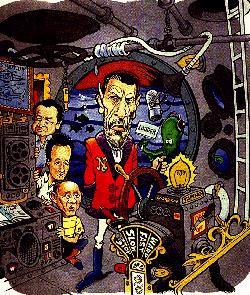 "The Mysterious Island"© Alien Voices®, Inc. All Rights ReservedWe're all familiar with the saying that work expands to fill the time allotted for it; Time Machine and Journey took about two months per title. The Lost World, however, because we were on a tighter deadline, took 10 days-yet this dramatization of the 1912 Sir Arthur Conan Doyle classic might very well be our best effort to date. After writing comes pre-production. This is where we engage the director and the actors, line up crew and book studio time. Like most projects, not only do we hire the best people for the job, we also hire our friends. We asked Jack Fletcher, a director I met as a student at Juilliard, to direct Time Machine and Journey. Leonard himself decided to direct Lost World. Joining us were Jeff Howell, our wonderful production supervisor; John Chominsky, a talented sound designer and master editor; and Peter Erskine, an award-winning jazz drummer who's making the leap into composing.
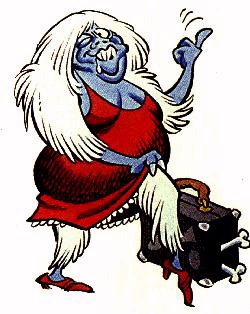 "The Time Machine"© Alien Voices®, Inc. All Rights ReservedThe actual recording takes approximately two days per title. These are long days and are frequently broken up by telling stories, all of which are screamingly funny but none of which I can repeat here. As much fun as we allow ourselves in the studio, the real test is whether it comes out on tape. That part of the process is the most laborious, time-consuming and costly. This is where Jeff "spots" the program that is, he goes through the tape and decides the best place to add sound effects, background presence and music. Then, Peter goes to work composing and recording a precise score. All this work is reviewed countless times by Leonard, Nat and me. Hundreds of man-hours are spent slaving over a digital editing console by several people (mostly Jeff and John). The last stage of the process is balancing, or mixing the tracks. The DAT (digital audio tape) masters are then handed lovingly over to Chris Lynch at Simon & Schuster Audio. Since most tapes are heard in a car, the sound specifications are very exacting. Simon & Schuster has been extremely supportive of Alien Voices. They have consulted with us at every stage of the process-marketing, artwork, publicity-yet they've left us free to pursue our artistic vision. Each title is being released both on audiocassette and compact disc-a rarity for books on tape and a testament to S&S's belief in the project and the understanding that SF fans are special. While the bulk of purchases will probably be audiocassette, those who listen to these productions on CD will have a heightened audio experience. It's not often that an actor gets to play the role of producer, too-which in this case means having some decision-making responsibilities. In the case of Alien Voices, we choose the material, write our own scripts, ask our friends to come and play with us, conceptualize how it might sound in its finished form and work closely with Simon & Schuster to come up with packaging that we think our public will appreciate. It doesn't get much better than that! Leonard and I have spent years speaking to the SF fan audience and, more importantly, listening to them. Alien Voices is the result of this extended conversation, and we hope that the audience will appreciate our efforts and realize that these first three titles are only the beginning of what will become a stream of SF classics worthy of their attention. And I don't say that lightly: not too long ago, I was at a convention where I asked the audience if they had any suggestions for audio works. A gentleman recommended Mark Twain's The Mysterious Stranger, which Nat immediately read and dramatized.
It was a wonderful suggestion made by an audience member that I took seriously and one that, we hope, in the future, our audience at large will be able to hear as realized by our own AlienVoices. * JOHN DE LANCIE, actor director and acting teacher; has been interviewed often in these pages. He is the co-creator of Alien Voices.
|
